Growing up I learned that we had 5 senses that helped us understand the world around us. I was taught about what these senses were and what part of my body was responsible for making them happen. What I didn’t learn was how vital and important their interaction and integration was. That is why I am excited to join with my friends at The Inspired Treehouse, a group of pediatric physical and occupational therapists, to bring you this series on all things Sensory Processing. This month we are talking about Auditory Input and its importance for growth and development in kids.
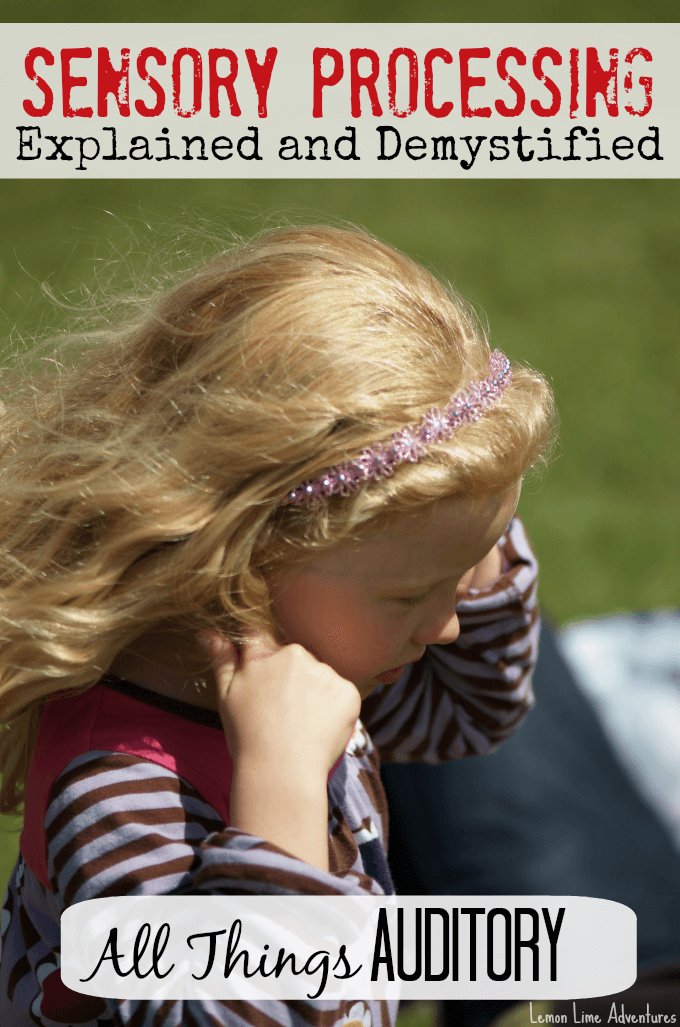
{THIS POST MAY CONTAIN AFFILIATE LINKS TO MATERIALS I RECOMMEND. ANYTHING YOU PURCHASE THROUGH THESE LINKS HELPS SUPPORT LEMON LIME ADVENTURES. THANK YOU IN ADVANCE FOR CHOOSING TO SUPPORT US.}
Just like last month, I will attempt to explain an aspect of Sensory Processing from my perspective. I will not attempt to use medical terms, explain what I don’t understand myself, or pretend to be an expert. My good friends, at The Inspired Treehouse, will bring you their take on the same topic, giving you a better understanding of Sensory Processing.
REMEMBER:
I am not a therapist or a doctor.
I am, simply, a mom raising a child with sensory needs.
I am, simply, an educator who taught in Early Childhood Education for 12 years.
I am, simply, just like you.

The Auditory System seems like it should be simple enough to explain. We all grew up learning about our sense of hearing. You either hear or you don’t, right? You don’t have to be familiar with Sensory Processing to be familiar with the word, Auditory. What we aren’t taught is the importance this system plays in our body’s ability to feel in control and centered. It is one system that continues to baffle me, especially when it relates to my own son (as you will read later).
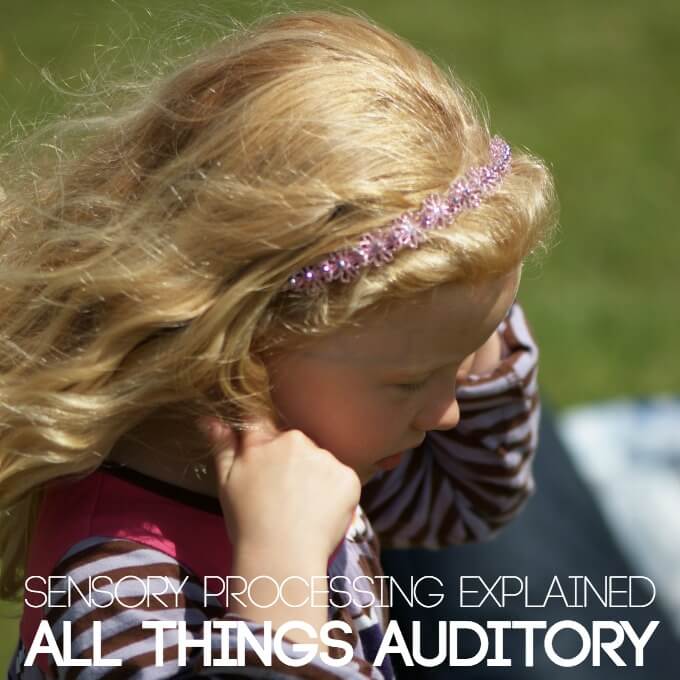
If I had to define the The Auditory System without using medical terms, I would define it as our body’s ability to process sounds and gather information from our surroundings. It isn’t simply about our ability to hear (an innate ability which can’t be taught), but our ability to listen which allows our body to interact with the sounds in our environment and make sense of what we hear.
We receive auditory input through our ears to gauge the importance of the sounds we here, where they come from, how close they are and whether we have heard those sounds before.
Footsteps, the sound of the wind against your ears, a door creaking, a flushing toilet, even the sounds of someone giving your directions. All of these require our body’s sense of auditory awareness to interpret the world around us. We have to determine which sounds are important, which ones mean safety and which one we should ignore. All of these things have one thing in common…
LISTENING
Without our auditory system, we are unable to discriminate and decipher sounds that are either important or just part of the environment. Right now as I type this I can hear a plane wooshing by, the keys being pressed as I type, birds chirping outside and the dishwasher signal going off. But if I listen closely, I also hear the whirr of the air conditioner, the cars on the street behind our house and the ticking of the clock. Sounds surround me and because of my auditory system, I am able to decipher which ones should be paid attention to and which ones should be ignored (for now).

If you are like me, you are wondering what this all means. What does this look like and why is it important?
As I mentioned before, Auditory Processing is all about interpreting sounds. All children require this awareness and input for proper development. The list of skills associated with auditory processing is long and exhaustive. Just to name a few, the auditory system is responsible for memory, sequencing, comparing and contrasting sounds, association of sounds to particular symbols such as letters/numbers/musical notes, and most importantly attention. The problem occurs when a child is either over or under responsive to receiving information from this system.
But here is where it gets tricky. Sometimes it can be very clear that a child is under or over responsive to sounds.
As an educator, I can vividly remember the children who refused to go to music class, covered their ears during the morning announcements and the ones who cried during fire drills. It isn’t hard to see that those children were overstimulated by auditory input! You feel sorry for these children, they are outwardly showing you that they are overwhelmed.
But what about the students who seek auditory input? The ones that constantly tap their pencil on the desk, the ones that can’t use an inside voice if their life depended on it, or the ones that seem to shout out absurdities during the middle of a quiet lesson. Those children seem “bad”, “disruptive”, “disrespectful”, right? What if I told you there could be underlying reasons they were doing those thing? What if I told you they were seeking auditory input to help their nervous system feel more “in balance.”
Oh then, theres those kids. You know the ones that NEVER seem to listen to a word you are saying. The ones that seem to never seem to respond to your requests, or seem to be daydreaming and not on task. What if I told you that many times these children are struggling with an under-responsive auditory system?
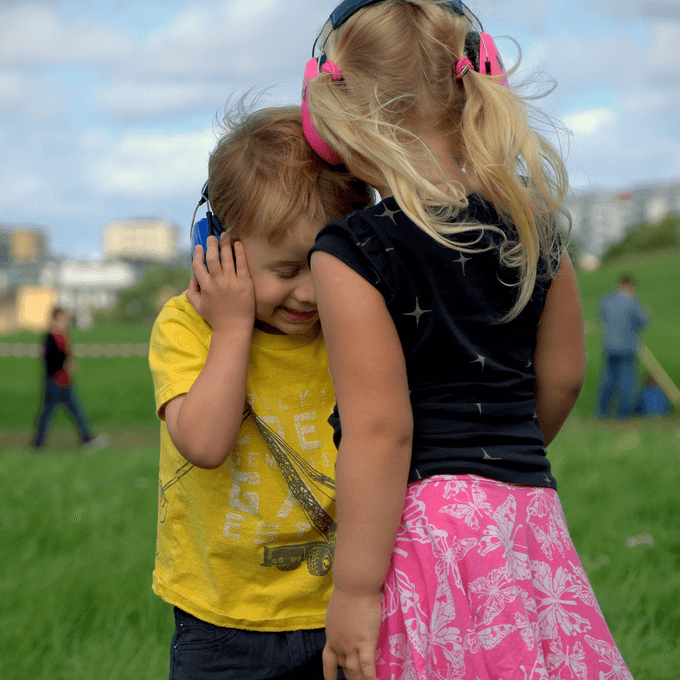
Remember how I told you this system baffles me? That is because with my son it isn’t one of these behaviors we see, its all of them at different times of the day or week we might see him react to sounds in his environment in any of the ways I mentioned before.
Before I learned about Sensory Processing Disorder, I never understood why Legoman shouted all the time. I worried that he might have hearing loss or that he had an ear infection that he wasn’t telling us about. I remember his father being so worried because despite all our attempts, he just seemed to shout everything at us. We can’t go to a Library or a store without some stranger telling my son to be quiet and use an “inside voice”. Sometimes I just want to shout back at them, HE CAN’T!
Then there’s the newer development of avoiding certain sounds. This seems to come and go based on how the rest of his systems and how “in control” his body is. Just this weekend we attempted to go to breakfast on vacation. We picked the best place in the city, had a family walk to the restaurant, and were ready to enjoy our family time. However, the minute we walked in, Legoman covered his ears and started to bounce from me to Papa Bear. You see, to him he heard EVERY NOISE… the dishes clanging, the babies crying, the cash register clinking, the coffee pouring, the bacon sizzling, the chairs scooting… he heard all of it. There was no way we could eat here, despite how much we wanted to.
One of the most confusing things that I have seen with Legoman is his reaction to loud and stimulating situations. Take him to a store, a crowded area, or an assembly at school and its like you unleash this different animal. He become over-excited, hyper, and full of energy. He becomes unmanagable. I used to dread going to any of these places with him, until I learned how interconnected the vestibular and auditory sense were and learned how to provide him with appropriate input before, during, and after a stimulating experience like the store.
Honestly, the more I learn about this system, the more I could write. It is so interconnected to speech, language, reading, planning, problem solving and so much more. We interpret everything with our ears and learn to trust the world around us based on our interpretations.
Remember, Sensory Processing is Complex. It is different for every child, because every child is unique. The problems arise when a child either seeks or avoids auditory input. For your convenience, I have compiled a Auditory System Cheat Sheet Printable listing behaviors you might see if your child is with avoiding or seeking this type of input.
Now its time to hop over to my good friends at The Inspired Treehouse, where they are sharing their tips as Pediatric therapists to explain Auditory Input and why they feel it is important to the growth and development of all children.

I love this video from Brain Pathways about the auditory system and how the brain receives and interprets speech and language.
Sometimes determining the difference between ADD and Sensory Processing can be difficult, as they look very similar. This post takes a look at the two separately.
For great Auditory Activities, check out Sensory Activities for Kids where they have an entire section just on Auditory activities and other bloggers come to link their auditory activities as well.
For a quick list of auditory activities, I like to refer to this list of 18 Auditory Activities you can do without spending a dime from Bonnie Terry Learning.
Last, but not least, you can follow me and the Inspired Treehouse on Pinterest for the latest in Sensory Play and Sensory Resources.
Follow Dayna :: Lemon Lime Adventures’s board Sensory Processing Resources on Pinterest.
Follow Dayna :: Lemon Lime Adventures’s board Sensory Play on Pinterest.
If you are looking for more ideas for Sensory Processing, you can check out my favorite picks onAmazon.
Do you know a child that seeks or avoids Auditory Input? Do you have a child with sensory needs? Has this post touched you in some way? I would love to know! Please send me a message or leave a comment. It helps when we know we are not alone.
Click the picture below to join our Support Group for Sensory Needs.
DID YOU ENJOY THIS POST? READ MORE FROM THIS SERIES
Sensory Processing | Tactile | Vestibular | Proprioceptive
Make sure you don’t miss the next in the series about Sensory Processing. Follow me on Facebook, Twitter, Google+, Pinterest, Instagram or subscribe by email in the sidebar.
photo credit: timparkinson via photopin cc
photo credit: ashraful kadir via photopin cc
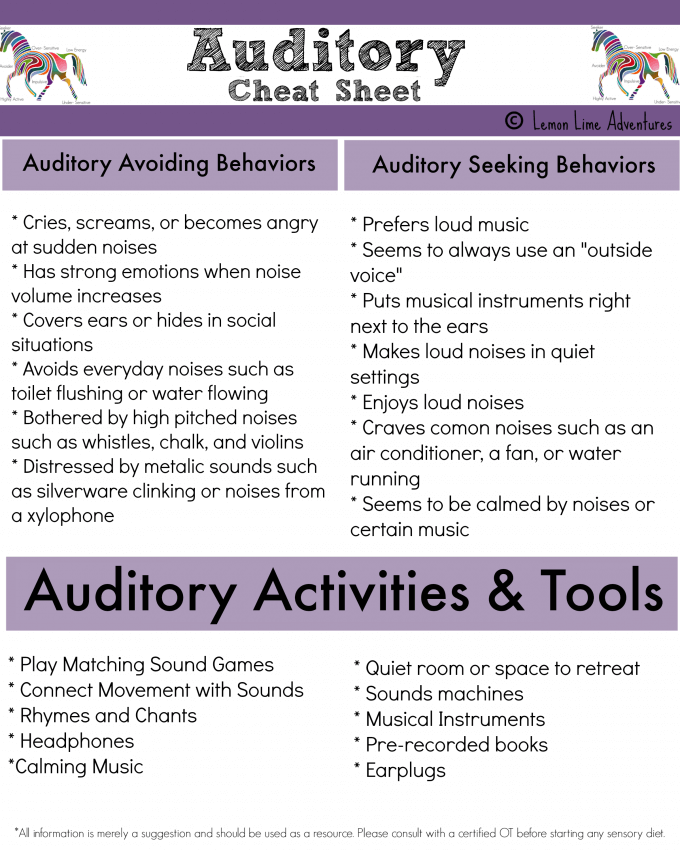
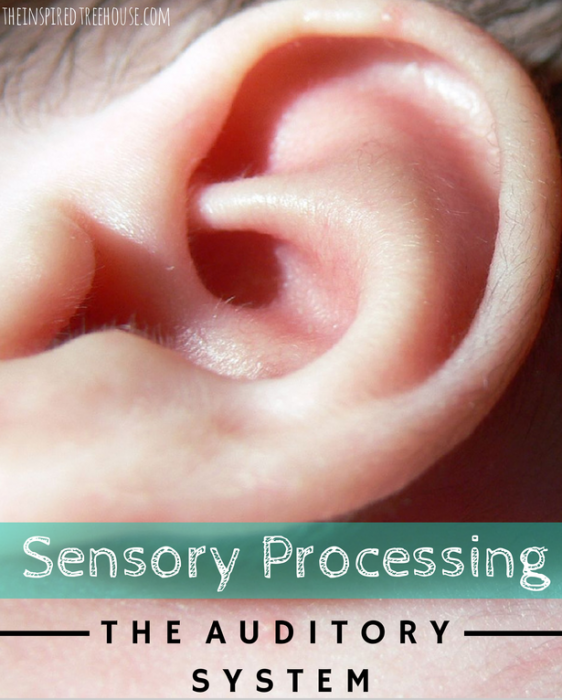
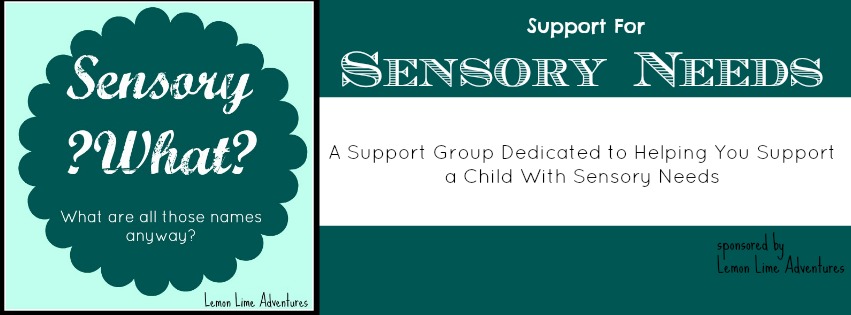







Thank you, thank you, thank you! For every post you ever write like this.
We have been waiting to see an OT, and this has helped me understand just a bit more what is going on with my son when he covers his ears and hides from groups of kids…
Off to check out some of those links!
Oh thank you so much for you kind words and your support! It means so much to me. I am so glad this has been helpful!
I’m trying so hard to figure this all out. Thank you for the info. After years of my sons pediatrician telling me my sons behavior is normal, I demanded to see a behavioral specialist. I’m sure he has an auditory sensory problem & am over whelmed at where to begin. He is now 8 years old, and I feel that I’m starting so late.
I’m so grateful for this blog series I actually start crying because of relief. My son is recently diagnosed with SPD and I’ve been doing OT exercises with him for 5 months I’ve noticed a huge difference as he’s a seeker of sensory input. There are some days that I need to go back to the drawing board and read and research. Then I find blogs like yours and I keep on persevering and advocating for my sons needs. Thank you for your all you do Dayna.
You just made my day. I am so happy that this post and this series has been helpful to you! It means the world, even if I am just helping one person!
Thank you for your posts on Sensory Processing. We are just starting down this road with our 4yo and so I am trying to learn all I can to help her since the wait lists for OT/PT here are long. She may have ASD too, but we’re still on a very long wait list to confirm either way. I think I also saw you on a homeschool video about special needs, which was very helpful to me as well.
I am so happy that this has been helpful to you! Feel free to join our little group for support if you need other parents to chat with.
My son was diagnosed with APD a few years ago and I am finding it is a continual learning process on how to help him. He hates school, because of the noise and we have a difficult time going to group events. It seems he reacts differently to different types of events. Thank you so much for your posts! The were informative and helpful!!!
Wow! My son who is 5yrs old was diagnosed with ADHD last year…and all his therapists he has seen says if he does not have it! Having read this now has put things in perspective for me now. This ticks all the boxes for me for my son. Thank you!!!
So glad it was helpful! Feel free to join our little support group! Everyone is super helpful and supportive!
Thanks for your article. It always helps to hear that there are other children who have similar struggles to my child’s.
You are very welcome!
Thank you for sharing. My child has sensory processing issues with sound. Loud sounds have made her very emotional since birth. Literally, it began in the hospital, we didn’t know what it was at the time. As an infant, dishes clanging, daddy’s sneezes and other loud sounds would cause her to be hysterical. To comfort and calm her was always a challenge. She also has some oral issues with foods. That was eventually addressed by doctors because she would not eat and basically stopped growing. A diagnosis of failure to thrive got doctors to finally listen to my concerns. But even when I mentioned the auditory issues, no one ever even addressed it. I just began to research and self-educate myself. We have muddled our way through trying to help her on our own over the years. She is 9 now and has learned handle most of her auditory over stimulation. She covers her hears and removes herself from a situation usual before getting upset now. But if for some reason we can’t remove her from the noise, she will get upset. She still struggles with thunder and will tell you it is because of the sound. Anyway, all that to say thank you for sharing the resources. I can’t wait to check them all out, discuss them with her and even try some new things to help. I look forward to reading more about sensory processing with other systems too. Have you already covered Oral Sensory Processing? I am very interested in that also. We went to feeding clinic for 1 year and then moved. Eating is still an adventure with her. 🙂
Pingback: Sensory Bottles | The What, Why & How - Lemon Lime Adventures
I knew my daughter had a hard time with being overstimulated by sound (toilets flushing, hand dryers, etc.) but never realized that she could also be under-stimulated. She often has problems listening to both me and her teachers (they even thought she had hearing problems and I thought she was ignoring me). Thank you for this post, it was very enlightening.
I am glad to hear that this post was helpful for you! As this is the main reason I write them. So other parents won’t feel so alone in this process.
I am an adult with Sensory Processing Disorder. I’ve lived my entire life with sensory issues. Sometimes when you think your children aren’t paying attention, it’s because there is too much background noise. Our brains have trouble filtering sounds. We hear EVERYTHING…not always the most important thing. Get up close and get their attention…so they hear you. It really is quite exhausting for our brains to always be on full alert trying to hear every sound. After a melt-down or a very exciting day, I always feel like I am hung-over and need an entire day to recuperate.
Thank you thank you for the helpful information. My son also has the same issues. He has digeorge syndrome. He also has tretrolagy of the fallot and had heart surgery when he was young. He’s doing great as in you can’t even tell he had heart surgery but will have to have them throughout his lifetime. He’s almost four and still not talking just bearly small words like ba bye, Dada, I’m still waiting on a momma he used to call me yaya now calls !e bubba. He also covers his ears whenever we go into a restroom because of how loud the toilet flushing is thy there’s other times too as well. He would rather not have other kids be there at the playground. He prefers adults over kids. He’s good at expressing himself to me but its so hard not being able to explain things to him like you would another kid his same age. Also has huge issues with food and the textures of things. And I also would be most greatful for any information on how to help him either overcome his texture issue or ideas of healthy eating for a kid with texture issues. He attends preeschool in a classroom were all the kids have disabilities of some sort he does pretty good but gets anxious and overwhelmed. Anybody have any helpful tips or research they have done ideas be most greatful! But he is a very sweet boy and we feel blessed to have him!
Your son sounds like an amazing little boy and like you are doing wonderful things for him. I would suggest joining sensory support groups. I also love A Sensory Life for great resource.
Pingback: Sensory Processing Explained | Oral Sensory System - Lemon Lime Adventures
Thank you so much for sharing this article. We have an 8 year old son diagnosed with APD. When you spoke about Legoman’s reaction to loud and stimulating situations…becoming unmanageable…it sounds just like our son. You went on to say that you learned how to provide him with appropriate input before, during and after a stimulating experience. Would you please share that information so we can help our son in these situations?
Thank you!
You are very welcome! I am so happy this could be helpful to you! As far as what we have learned… We have learned to provide our son with a lot of proprioceptive input before and during a trip to the store or in an overwhelming situation. We also have learned to take gum, or chewies with us everywhere. Lastly, we almost always take noise reducing earmuffs.
I hope this was helpful. You might be interested in our support group or in our new site Project Sensory.
This is a great read.. I have been so confused with all the jargon on these assessments.. This makes it so easy to understand. One question… Do you think auditory processing disorder needs to be diagnosed by a specialist audiologist… Or is an educational psychologist diagnosis sufficient.. I have been told by my child dad to get a another opinion from an audiologist and I am even more confused now.. In the meantime, he is 10 and I feel that his residual spd is being untreated and his newer diagnosis of adp is being ignored.. What are your thoughts..?? Please help.. Thx… C
Pingback: Auditory System: Sensory Processing Explained
i am curious what are some activities that help an auditory sensory seeking child with trips to the store or other busy places?
Before any trip to the store we add in some proprioceptive work such as wheelbarrow walks and I allow him to push the cart. We also bring along some gum and a water bottle to give him sensory organizational support. Lately, the best thing we have found is using the noise reduction ear muffs.
Pingback: Don't Call My Kid a Cry-Baby! - Stir The Wonder
Pingback: What is sensory processing and how can I understand my child? -
I have a 13 year old son that struggles with these very issues. When I speak to his school about him having auditory sensory issues they tell me it is all in my head or do not believe me. During an IEP meeting recently I had a school psychologist that told us that my son would yell out in class just for attention. I want to print this article for his teachers, yes each and every one of them to read. Maybe someone will understand my child and instead of labeling him impulsive and bad realize there is something he needs during these times. My son has never had a diagnoses because he presents like a typical child, is there some one we can talk to find out about a diagnosis? This is something that my son needs to understand as he begins high school so he is not an outcast or labeled bad.
My son was diagnosed with ADD and now I’m wondering if it’s spd …
I have a 14 year old who was diagnosed with Language Auditory Processing Disorder when he was 5. I am so pleased to see more emphasis on understanding how best support those who suffer. He has come a long way, but still has issues with fluency, comprehension and being able to articulate verbally or written grammatically correct sentences.
I have learned a bit about Sensory Processing Disorder over the past few years and it really shed some light on some of my daughter’s behaviors. She has either outgrown or learned how to cope with many of the things that used to really upset her, but there are a few things that still cause her much anxiety (loud noises like certain public toilets that are exceptionally loud are a biggie). The book “The Out of Sync Child” was a good resource for us as well as learning from a therapist some coping strategies to try. Thanks for the info!
Hello, My son is now four years old and has always become over-excited and hyper in new or crowded places. He usually cover his ears with loud or new noises , hates hand dryers, shaving machines and hair dryers. He cannot stand clapping and the b-day song and also he seeks for bell’s sound.
You said you “learned how to provide him with appropriate input before, during, and after a stimulating experience” I was wonder what exactly is that input? I would appreciate if you can tell me how can I help my son to regulate himself before, during, and after those experiences. Thank you!
Usually your county has free or discounted resources: occupational therapy, etc. They can evaluate and decide what therapies will work for his specific needs. Every kid is approached individually. However. I will say, we have cut down our son’s tv time to 30 min Or less a day and it is definitely helping. Ask his pediatrician. Mine was able to point us to the right people.
I loved this post! I have been looking into Sensory Processing as I feel it fits my sons behaviors too. This really got home because he had many ear infections which led to tubes at 9 months old and now at 3 has been in speech for a year so bringing in the Auditory part really made me think of some of the reactions he has to noise or lack of. Thank you!
Very interesting to read, it reminded me of my 4yr who has past a hearing test and doesn’t communicate well but covers his ears when flushing toilets, turning on vents in bathrooms and other loud noises. He can repeat but will not hold conversations. It’s frustrating when they say be patient and give him time.
We just had our 3 year old son evaluated for SPD. He was having issues in preschool and having a difficult time potty training. I know he’s a boy and they typically potty train later than girls, but he just seemed different. It is like he doesn’t feel the sensation the same as the average person. When sick, he doesn’t act like a sick child. In any case, we confirmed it is SPD. He is a seeker for sure: Talks loudly all the time, etc. Constantly moving, loves crashing into things, always touching things, and so on. I’m just glad he will get the help he needs. I know I avoid large crowds, hate lots of noise. I definitely see these things in myself. Great article. I’ve read this is a common issue among kids, just not always diagnosed correctly.
Pingback: Beginner's Guide to the Auditory Sensory System - Melissa & Doug Blog
Pingback: Vestibular Input: Sensory Processing Explained - Lemon Lime Adventures
Pingback: Tactile Input: Sensory Processing Explained - Lemon Lime Adventures
Pingback: Simple Breathing Exercises to Calm an Anxious Child
This is fascinating! I’ve thought my DD7 has had a processing disorder but I’ve mentioned it to doctors and educators and they don’t seem too concerned. They haven’t been with me the times she’s had a complete come apart over automatic toilets. Fortunately, the older she gets the better she gets with coping. She also talks very loudly. I don’t know if it is worth seeking therapy. I have wondered if my DS4 might have an issue as well but I can’t figure out his triggers. He has been a grumpy little thing since he was an infant. He can be sweet and then get so mad. This morning he was upset that we didn’t have blueberry waffles. Anyway, thank you for the information!
Pingback: Proprioceptive Input: Sensory Processing Explained
Thank you so much for this article! See, the funny thing is that I have a daughter who has SPD and we have worked with her and a therapist for 8 years. She is, among other things, a auditory avoider – which we knew. What we didn’t know is that my other daughter who we never thought had sensory processing issues is actually starting to show more an more signs of it. After reading this she is TOTALLY a auditory seeker. She just turned 5 and started Kindergarten, I thought it would help give her some focus and something to look forward to everyday…but instead she comes home overly wound up, loud, un-responsive to directions and so many other things. We just changed my older daughters sensory diet, and while doing so realized it might be time to start my younger daughter on a sensory diet of her own…but I had no idea where to start with a sensory seeker. This has helped so much. Thank you!!
Pingback: The Newbie's Guide to Sensory Processing | A Basic Overview
I’ve just bookmarked this page, wonderful website!
Pingback: WHAT IS THE AUDITORY SYSTEM AND SENSORY PROCESSING